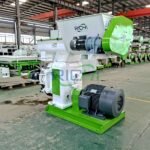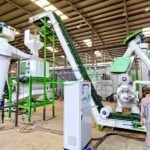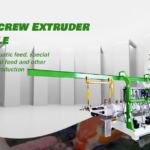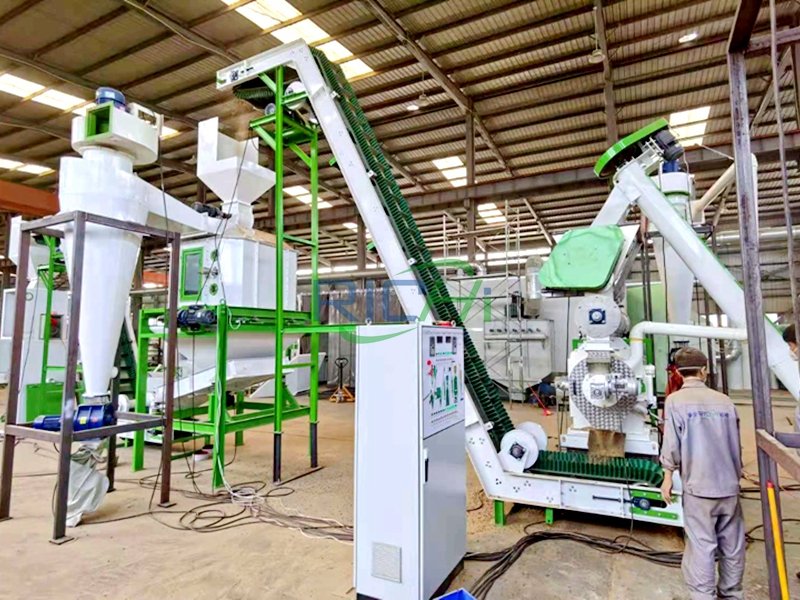What is a Biomass Pellet Mill?
A biomass pellet mill is a specialized machine designed to transform organic materials, such as wood chips, agricultural residues, and other biomass feedstocks, into compact, uniform pellets. These pellets serve as a renewable energy source, offering a sustainable alternative to fossil fuels. The primary function of a biomass pellet mill revolves around the process of pelletization, wherein raw biomass is compressed under heat and pressure to create a dense pellet. This transformation not only enhances the energy density of the material but also facilitates easier handling, storage, and transportation.
The operation of a biomass pellet mill typically involves several stages. Initially, the raw biomass is processed to ensure that it is free from contaminants and sized appropriately. This may include grinding to reduce the material to a finer consistency. Following this preparation, the biomass is subjected to the pelletizing process, where it is forced through a die under high pressure, causing the organic fibers to bind together. The heat generated during this process further promotes the binding, resulting in durable pellets that can be used in various energy applications.
The significance of biomass pellets in the renewable energy sector cannot be understated. These pellets can be utilized in residential heating systems, industrial boilers, and electricity generation facilities. The use of biomass pellets significantly reduces greenhouse gas emissions compared to traditional fossil fuels, thus contributing to the fight against climate change. Moreover, the biomass pellet mill plays a crucial role in establishing a circular economy by converting waste products into valuable energy sources. In a world increasingly moving towards sustainable practices, the biomass pellet mill stands as a key player in advancing renewable energy and promoting ecological stewardship.
Benefits of Using a Biomass Pellet Mill
Biomass pellet mills present a variety of benefits that contribute significantly to both environmental sustainability and economic growth. First and foremost, they enhance energy efficiency. Biomass pellets serve as a renewable energy source that can replace traditional fossil fuels. By utilizing sustainable materials, such as agricultural byproducts and wood waste, these pellets provide a cleaner alternative that minimizes carbon emissions.
Another key benefit is the reduced emissions associated with biomass compared to fossil fuels. When burned, biomass pellets produce lower levels of carbon dioxide, sulfur dioxide, and other harmful pollutants, effectively contributing to cleaner air and supporting climate change mitigation efforts. This reduction in emissions is especially important in an era of increasing environmental awareness and regulatory pressures.
The compact size of biomass pellets further underscores their practicality. Pellets are easier to store and transport than bulk biomass materials, leading to more efficient logistics. This convenient sizing allows for the adoption of more efficient supply chains, ultimately making the entire process more cost-effective.
Additionally, the use of biomass pellet mills facilitates waste recycling. Many biomass feedstocks such as wood scraps, agricultural residues, and even municipal waste can be transformed into valuable energy resources, thereby diverting waste from landfills and contributing to a circular economy.
Lastly, the economic benefits of utilizing biomass cannot be overstated. Biomass pellet mills offer reduced fuel costs in comparison to traditional energy sources, allowing consumers and businesses to save money. Furthermore, the growth of this sector creates job opportunities in areas such as manufacturing, transportation, and renewable energy service, fostering local economies and contributing to a sustainable future.
Reasons to Choose a Biomass Pellet Mill
Choosing a biomass pellet mill offers numerous advantages that cater to diverse applications, making it an attractive choice for both industrial and residential users. One of the standout features of these mills is their versatility in feedstock. Biomass pellet mills can process a wide range of materials, including wood residues, agricultural waste, and other organic materials. This adaptability allows users to select feedstocks that are readily available in their region, potentially reducing transportation costs and enhancing resource utilization.
Scalability is another compelling reason to consider a biomass pellet mill. These mills can be tailored to meet different production demands, whether one is looking to produce small quantities for personal use or large volumes for commercial applications. This scalability ensures that businesses can expand their production capabilities as their needs evolve without having to invest in entirely new equipment.
Durability is a significant factor as well. High-quality biomass pellet mills are designed to withstand rigorous operations, ensuring longevity and reducing maintenance costs. This durability is essential for businesses that rely on consistent production schedules, as it minimizes downtime and enhances overall operational efficiency.
Cost-effectiveness over the long term is a crucial consideration when selecting machinery. Although the initial investment in a biomass pellet mill may be substantial, the potential for substantial energy savings and the ability to utilize low-cost feedstocks make it a financially sound decision. Furthermore, transforming waste into pellets not only adds value but also can lead to additional revenue streams.
Finally, environmental sustainability plays a pivotal role in the decision to invest in a biomass pellet mill. This type of operation contributes to carbon-neutral energy production and helps reduce the reliance on fossil fuels, aligning with the growing global emphasis on eco-friendly energy solutions. With these compelling reasons, it becomes clear that a biomass pellet mill represents an excellent investment for those looking to improve energy efficiency while supporting sustainable practices.
Understanding the Working Principle of a Biomass Pellet Mill
The biomass pellet mill operates through a series of mechanical and thermophysical processes that transform raw biomass materials into compact pellets. (Biomass pellet production line) This process can be broken down into several distinct phases:
- Material Feeding: The production process begins with the careful feeding of raw biomass material into the pellet mill. This can include wood shavings, agricultural residues, and other organic matter. The consistency and size of the feedstock are crucial, as they significantly affect the efficiency of the subsequent steps.
- Compression: After the materials are fed into the biomass pellet mill, they are subjected to compressive forces. This occurs within the die, where rollers exert pressure on the biomass, reducing its volume and facilitating bonding. The heat generated during this compression process plays a vital role in softening the lignin present in the biomass, which serves as a natural adhesive.
- Shaping: Following compression, the material is forced through the holes in the die to form pellets of desired shape and size. The die’s specifications determine the dimensions of the pellets, and careful selection is imperative to meet usability standards for various applications. The interaction between the die and the roller system is critical for achieving uniformity in pellet size.
- Cooling: Once the pellets are formed, they exit the die at high temperatures due to the heat generated during compression. It is essential to cool the pellets to stabilize their structure and reduce moisture content. This cooling process enhances the durability of the pellets, making them suitable for storage and transportation.
Factors such as moisture content and raw material characteristics substantially influence the efficiency of the biomass pellet mill. Optimal moisture levels, typically around 10-15%, are necessary to ensure effective pelletization and to minimize wear on the machinery. Understanding these processes enables operators to fine-tune them for better productivity and quality of the final product.
Specifications of Biomass Pellet Mills
Biomass pellet mills are designed with a variety of specifications that cater to different production needs and capacities. Below is a detailed review of the essential parameters:
- Capacity: Biomass pellet mills come in various capacities, typically ranging from 200 kg/h to over 5,000 kg/h. The choice of capacity depends on the scale of operation, whether for small-scale farming or large industrial production.
- Power Requirements: The power requirements for biomass pellet mills can vary widely, from as low as 3 kW for small units to over 300 kW for large, heavy-duty models. It is essential to assess the power supply available to ensure optimal operation.
- Types of Drive Systems: Most biomass pellet mills utilize either electric or diesel drive systems. Electric mills are advantageous for their efficiency and lower operating costs, while diesel mills offer mobility for operations in remote locations.
- Material Handling Features: Efficiency in handling raw materials is crucial for the performance of biomass pellet mills. Features such as integrated conveyors for feeding raw materials, cooling systems for pellets, and feed hoppers are common in advanced models.
Target Customers for Biomass Pellet Mills
Understanding the target customers is vital for manufacturers and suppliers of biomass pellet mills. Key customer segments include:
- Small-Scale Farmers: These individuals often seek biomass pellet mills to convert agricultural waste into pellets for use as an eco-friendly heating source, creating a sustainable farming operation.
- Commercial Energy Producers: Companies engaged in energy production benefit from biomass pellet mills to produce renewable energy from biomass, thus contributing to energy sustainability and reducing dependence on fossil fuels.
- Large Industrial Operations: Industries that require large volumes of fuel often invest in biomass pellet mills to ensure a consistent supply of biomass pellets for heating and power generation, thus enhancing operational efficiency.
In conclusion, the appropriate selection of a biomass pellet mill is instrumental in fulfilling different needs across various sectors while considering its specifications and target user segments.
Why Choose Richi Machinery as Your Biomass Pellet Mill Supplier?
When it comes to selecting a biomass pellet mill supplier, Richi Machinery stands out due to its unwavering commitment to quality, customer service, and technical support. As a reputable manufacturer in the biomass conversion industry, Richi Machinery has built a solid reputation as a reliable partner for businesses looking to harness the potential of biomass energy. Below are some compelling reasons to consider Richi Machinery as your preferred supplier for biomass pellet mills. https://www.richimanufacture.com/pellet-equipment-products/
- Innovative Technology: Richi Machinery employs cutting-edge technology in the production of biomass pellet mills, ensuring enhanced efficiency and performance. Their state-of-the-art machines are designed to optimize the pelletizing process, thus increasing production quality and output.
- Customization Options: Recognizing that every business has unique requirements, Richi Machinery offers a range of customization options for their biomass pellet mills. Whether it is adaptations in size, design, or functionality, customers can tailor the equipment to meet specific operational needs.
- After-Sale Services: The commitment to customer satisfaction extends beyond the purchase of equipment. Richi Machinery provides robust after-sale services, including installation, maintenance, and repair support, ensuring that clients enjoy uninterrupted operations for their biomass processing ventures.
- Positive Customer Testimonials: Feedback from clients speaks volumes about the reliability of Richi Machinery’s products and services. Numerous testimonials highlight the efficiency, durability, and superior performance of their biomass pellet mills, reinforcing the company’s stature in the market.
By choosing Richi Machinery as your biomass pellet mill supplier, you are not only investing in high-quality machinery but also forming a partnership grounded in trust and support. The blend of innovative technology, customization, and dedicated service makes Richi Machinery an ideal choice for all your biomass processing requirements.






